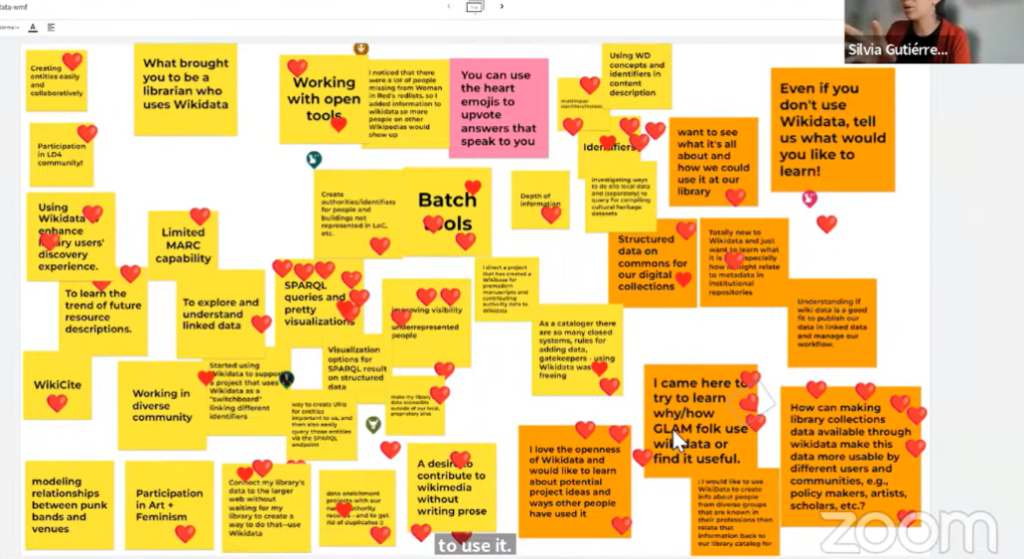In the first post of this series, we introduced the workshop that started this all: an LD42023 hour, in which Giovanna and I learned what librarians think about Wikidata. In that post, we promised to continue this six-part series, telling you more about who these librarians are.
Using an adapted version of OpenCon’s “Story of Self” circles, participants could step away from their professional profiles and share the personal journeys that led them to become librarians engaged with Wikidata or eager to explore its potential further. A virtual Jamboard provided a collaborative space for these exchanges.

What brought you to be a librarian who uses Wikidata? The section starts in the recording at 15:47
So, what has brought librarians to participate in the Linked Open Data movement in Wikidata? We could group the answers into five categories.
- Librarians like Wikidata because it allows them to normalize and enrich their data. One of the top-voted characteristics was identifiers (4 ♥️), and someone mentioned they “started using Wikidata to support a project that uses Wikidata as a ‘switchboard’ linking different identifiers. Similarly, many are drawn to this project because they are confronted with the limited options of traditional cataloging, for instance, they love how Wikidata allows them to model relationships (“Modeling relationships between punk bands and venues”); connect their datasets with the larger web (“Connect my library’s data to the larger web without waiting for my library to create ways”); enhance digital collections with linked metadata for images (“Structured data on Commons for digital collections” 2♥️ – for more, check the pages about SDC and visual artworks or SDC and the ‘Depicts’ property); expanding the limited capabilities of MARC (1♥️) and using Wikidata concepts and identifiers in the content description.
- Tools are another exciting aspect; we’ll discuss this more in our fourth post. For now, it suffices to say that SPARQL queries (the language to retrieve Wikidata’s semantic data) and pretty visualizations were at the top of everyone’s mind (7♥️). However, batch tools –i.e. tools to upload, export, or import a lot of data to/from Wikidata– were also mentioned.
- Many come to Wikidata to learn. Some want to understand technical aspects like the “trend of future resource descriptions (2♥️); how to “link [Wikidata] to metadata in Institutional Repositories”; or simply how linked data works (1♥️). Others are curious about how Wikidata can be helpful in their libraries. They seek inspiration from other projects (a topic we will cover in the next post) and want to understand how making library collections data available through Wikidata makes this data more usable by different users and communities, e.g, policymakers, artists, scholars, etc.? (6♥️)
- Moreover, many librarians highlighted that this work is “easily done collaboratively” (1♥️), in a diverse community. Special appreciation was given to the LD4 community (1♥️), and the Art + Feminism Team!
- No less important was the fact that the fruits of this collaborative and diverse community enabled equity in open knowledge. First, it gives librarians not keen on writing prose on Wikipedia an alternative to contribute to Wikimedia’s open knowledge ecosystem in their language: data! Second, it gave them a venue for their activism on improving the visibility of underrepresented people (3♥️); closing the gender gap (like adding women to Wikidata, thus improving Women in Red’s redlists); working with open tools (2♥️); and creating authorities for missing buildings/concepts/etc were some of the aspects that kept librarians learning more. One librarian said:
As a cataloger there are so many closed systems, rules for adding data, and gatekeepers that using Wikidata was freeing <3 (2♥️)
So many inspiring reasons to join this collaborative and diverse community, but wait, there will be more! So here’s again the list of the series of posts, we’ll add the hyperlinks as we publish!
- #LD42023 I: The Future of Wikidata + Libraries (A Workshop)
- #LD42023 II: Getting to Know Each Other, Librarians in the Wikidata World (this post!)👈
- #LD42023 III: The Examples, Libraries Using Wikidata
- #LD42023 IV: Wikidata Tools everyone is talking about
- #LD42023 V: Main Challenges of Wikidata for Librarians
- #LD42023 VI: Imagining a Wikidata Future for Librarians, Together

Can you help us translate this article?
In order for this article to reach as many people as possible we would like your help. Can you translate this article to get the message out?
Start translation